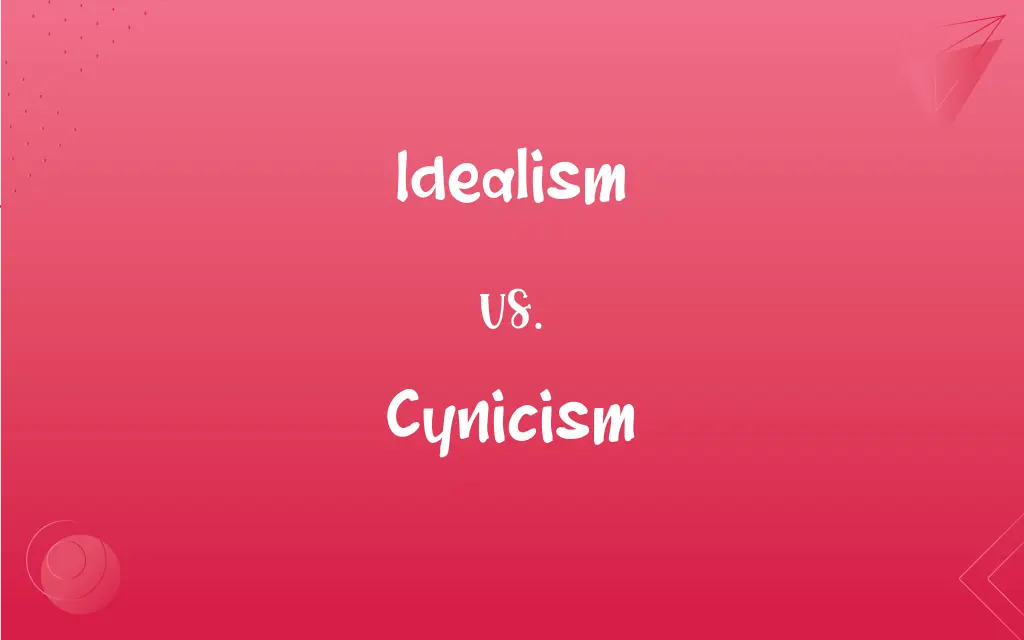Idealism vs. Cynicism: What's the Difference?
Edited by Harlon Moss || By Janet White || Updated on October 5, 2023
"Idealism" is the belief in the pursuit of noble ideals, often unrealistically so, while "Cynicism" is a distrustful attitude, often doubting sincerity or goodness.

Key Differences
"Idealism" and "Cynicism" stand as contrasting approaches to interpreting the world and human nature. Idealism centers on the belief that ideas or ideals are the primary components of reality and that striving towards them is a worthy pursuit. Cynicism, on the other hand, emphasizes skepticism, often doubting the sincerity or goodness of human intentions and actions.
An individual driven by Idealism tends to view the world with optimism, believing in the potential for positive change and often advocating for causes that might seem unattainable. Meanwhile, a person inclined towards Cynicism might question the true motives behind such efforts, suspecting hidden agendas or viewing such pursuits as naive.
Philosophically, Idealism posits that reality is fundamentally based on ideas and consciousness. For the idealist, ideas can shape and transform the world. In contrast, Cynicism, in its ancient philosophy context, was about living in accordance with nature and challenging societal norms, but it has evolved today into an attitude of distrust, especially towards motives of others.
Idealism can sometimes be critiqued for being overly optimistic or out of touch with reality, as it tends to elevate ideals above pragmatic concerns. Cynicism, though rooted in caution and skepticism, can be critiqued for being overly negative or dismissive of genuine efforts or sentiments.
In essence, while Idealism and Cynicism both offer lenses to view the world, the former leans towards hope and the latter towards doubt, each with its merits and pitfalls.
ADVERTISEMENT
Comparison Chart
Basic Attitude
Optimistic about potential
Distrustful and skeptical
View on Human Nature
Belief in inherent goodness
Doubt in sincerity or motives
Approach to Reality
Views ideas as central to reality
Questions genuine nature of reality
Criticism
Seen as naive or unrealistic
Viewed as overly negative or dismissive
Example in Thought
Belief that love can conquer all
Doubt that most people act without ulterior motives
ADVERTISEMENT
Idealism and Cynicism Definitions
Idealism
The belief or theory that the self is all that can be known to exist
Idealism suggests our consciousness shapes our world.
Cynicism
Distrustful attitude doubting sincerity or goodness
His cynicism made him question every charitable act.
Idealism
Optimism regarding human nature and potential
His idealism never wavered, even in difficult times.
Cynicism
Disbelief in the genuineness of human emotions or actions
Cynicism kept her from believing in love at first sight.
Idealism
Philosophy that ideas form the only true reality
His idealism led him to believe that thoughts could transform existence.
Cynicism
Ancient philosophy advocating living true to nature and challenging societal norms
Ancient cynicism questioned the merits of civilization.
Idealism
The act or practice of envisioning things in an ideal and often impractical form.
Cynicism
Belief that people are driven by selfish motives
Cynicism led her to doubt politicians' promises.
Idealism
Pursuit of one's ideals, often without regard to practical ends.
Cynicism
An attitude of scornful or jaded negativity, especially a general distrust of the integrity or professed motives of others
The public cynicism aroused by governmental scandals.
Idealism
Idealized treatment of a subject in literature or art.
Cynicism
A scornfully or jadedly negative comment or act
"She arrived at a philosophy of her own, all made up of her private notations and cynicisms" (Henry James).
Idealism
(Philosophy) The theory that the object of external perception, in itself or as perceived, consists of ideas.
Cynicism
Cynicism The beliefs of the ancient Cynics.
Idealism
The property of a person of having high ideals that are usually unrealizable or at odds with practical life.
Cynicism
(uncountable) A distrustful attitude.
Idealism
The practice or habit of giving or attributing ideal form or character to things; treatment of things in art or literature according to ideal standards or patterns;—opposed to realism.
Cynicism
(uncountable) An emotion of jaded negativity, or a general distrust of the integrity or professed motives of other people. Cynicism can manifest itself by frustration, disillusionment and distrust in regard to organizations, authorities and other aspects of society, often due to previous bad experience. Cynics often view others as motivated solely by disguised self-interest.
Idealism
(philosophy) An approach to philosophical enquiry, which asserts that direct and immediate knowledge can only be had of ideas or mental pictures.
Cynicism
(countable) A skeptical, scornful or pessimistic comment or act.
Idealism
The quality or state of being ideal.
Cynicism
The doctrine of the Cynics; the quality of being cynical; the mental state, opinions, or conduct, of a cynic; morose and contemptuous views and opinions.
Idealism
Conception of the ideal; imagery.
Cynicism
A cynical feeling of distrust
Idealism
The system or theory that denies the existence of material bodies, and teaches that we have no rational grounds to believe in the reality of anything but ideas and their relations.
Cynicism
A skeptical outlook on societal conventions
His cynicism was evident when he critiqued popular culture.
Idealism
The practice or habit of giving or attributing ideal form or character to things; treatment of things in art or literature according to ideal standards or patterns; - opposed to realism.
Idealism
A belief in the feasibility of the implementation of ideal principles and noble goals, and the practice or habit of pursuing such goals; - opposed to realism and cynicism.
Idealism
(philosophy) the philosophical theory that ideas are the only reality
Idealism
Impracticality by virtue of thinking of things in their ideal form rather than as they really are
Idealism
Elevated ideals or conduct; the quality of believing that ideals should be pursued
Idealism
Pursuit of noble ideals, often unrealistically
Her idealism pushed her to advocate for global peace.
Idealism
The practice of forming ideals or living under their influence
His idealism was evident in his charitable works.
FAQs
Does Cynicism always doubt sincerity?
Typically, cynicism involves skepticism of motives or sincerity, whereas idealism tends to trust in good intentions.
Can Idealism drive social change?
Yes, idealism can inspire positive change, while cynicism might challenge the genuineness of such efforts.
Can Idealism lead to disappointment?
Yes, lofty ideals of idealism might lead to disappointment, unlike cynicism which often expects the worst.
Can Cynicism be considered a defense mechanism?
Yes, cynicism can be a way to guard against disappointment, whereas idealism often exposes oneself to potential letdowns.
Can you be both an idealist and a cynic?
It's possible to have idealistic dreams but cynical views on their attainment, combining both outlooks.
Is Idealism always out of touch with reality?
No, but extreme idealism can be seen as naive, unlike cynicism which is rooted in skepticism of reality.
How do Idealism and Cynicism view human nature?
Idealism often views humans positively, believing in potential goodness, while cynicism is more doubtful of sincerity.
Can Cynicism be constructive?
When tempered, cynicism can be a constructive force, offering critical viewpoints, whereas unchecked idealism might overlook flaws.
Which is more pragmatic, Idealism or Cynicism?
Cynicism is often seen as more pragmatic due to its skepticism, while idealism emphasizes lofty goals.
Do Idealists always trust people?
Not always, but idealism tends to give people the benefit of the doubt, unlike cynicism which is more skeptical.
Why might people become cynical?
Repeated disappointments or betrayals can lead to cynicism, unlike idealism which tends to remain hopeful.
Can art be a medium for Idealism?
Absolutely, art often reflects idealistic visions of the world, whereas cynicism might critique societal norms through art.
Are children more Idealistic than adults?
Often, children display more idealism, being untainted by life's disappointments, whereas adults might develop cynicism.
Can Cynicism hinder personal relationships?
Yes, constant cynicism can strain relationships, while idealism can foster trust and connection.
Is Idealism common in youth movements?
Yes, youth movements often display idealism, pushing for change, while cynicism might emerge with age and experience.
Can Idealism be found in literature?
Definitely, literature often explores idealistic themes and aspirations, whereas cynicism might question them.
How do Idealism and Cynicism impact leadership?
Idealistic leaders can inspire and motivate, while cynical leaders might be more cautious and skeptical of motives.
Is Cynicism always negative?
While cynicism leans towards distrust, it's not always negative and can be protective. Idealism, on the other hand, is often positive.
Do Idealists believe in utopias?
Many idealists hold utopian views, aiming for perfect societies, unlike cynics who doubt such possibilities.
Are there benefits to Cynicism?
Yes, cynicism can offer protective skepticism and prevent naivety, whereas idealism might expose one to potential hurts.
About Author
Written by
Janet WhiteJanet White has been an esteemed writer and blogger for Difference Wiki. Holding a Master's degree in Science and Medical Journalism from the prestigious Boston University, she has consistently demonstrated her expertise and passion for her field. When she's not immersed in her work, Janet relishes her time exercising, delving into a good book, and cherishing moments with friends and family.
Edited by
Harlon MossHarlon is a seasoned quality moderator and accomplished content writer for Difference Wiki. An alumnus of the prestigious University of California, he earned his degree in Computer Science. Leveraging his academic background, Harlon brings a meticulous and informed perspective to his work, ensuring content accuracy and excellence.
































































